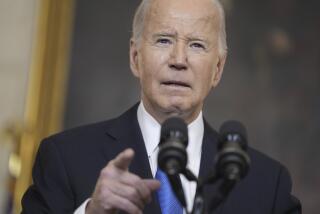Key GOP figure rejects quick vote on New START nuclear treaty
- Share via
Reporting from Washington — The Republican point man on nuclear arms issues said Tuesday that he would not support a quick Senate vote on the New START treaty with Russia, dealing a major blow to the Obama administration’s hopes for the weapons agreement and potentially improved relations with Moscow.
Sen. Jon Kyl (R-Ariz.) said that despite aggressive administration lobbying to win GOP support for a quick vote, there is too little time in the Senate’s lame-duck session to weigh the complicated issues covered in the treaty. The text of the accord was given to the Senate in late April, a few weeks after it was signed in Prague by President Obama and Russian President Dmitri Medvedev.
Kyl said he told Senate Majority Leader Harry Reid (D-Nev.) that he did not think a vote on the treaty could be supported “given the combination of other work Congress must do and the complex and unresolved issues related to START and modernization” of U.S. nuclear weapons systems.
A number of other Republicans, including Sen. Minority Leader Mitch McConnell of Kentucky, say they would follow Kyl’s lead.
Obama has said recently that U.S. ratification of the treaty is a top priority, and administration and Democratic leaders were surprised and angered by Kyl’s announcement. They said they would continue pushing the Republicans to agree to a vote.
Sen. John Kerry (D-Mass.) chairman of the Senate Foreign Relations Committee, said, “We have to deal with this; our relationship with Russia is at stake.
“If we don’t have time to deal with the security of our country, something is really wrong with the Senate.”
Administration officials fear that if the treaty vote is put off until next year, when the Republicans will have six more seats in the Senate, the odds of ratification will drop. At that point, to secure the necessary 67 votes — treaties require approval by two-thirds of the Senate — the administration will need 14 Republican votes if every Democrat backs the measure.
In addition, there is a risk that Senate resistance will cause the Russians to try to revise or reject the treaty, souring U.S.-Russian relations. Russian lawmakers have already warned that they are unhappy with what they viewed as American lawmakers’ attempts to reinterpret the pact.
The treaty, and the broader “reset” of relations with Russia, has been among the few major foreign policy accomplishments of an administration that is struggling with the deepening Afghan war, stalled Mideast peace talks and an Iranian leadership that appears determined to develop a nuclear bomb.
The treaty would lower by 30% the cap on the number of long-range active nuclear warheads in the arsenals of Russia and the United States.
Many analysts consider New START a small step. It has strong support from U.S. military officials and former senior diplomats.
More to Read
Get the L.A. Times Politics newsletter
Deeply reported insights into legislation, politics and policy from Sacramento, Washington and beyond. In your inbox twice per week.
You may occasionally receive promotional content from the Los Angeles Times.












